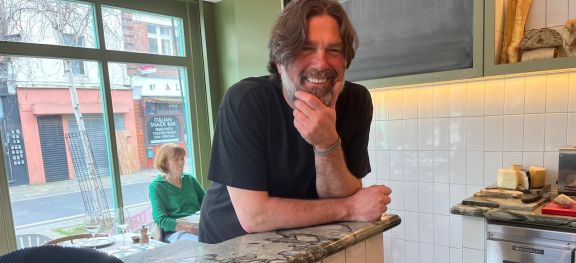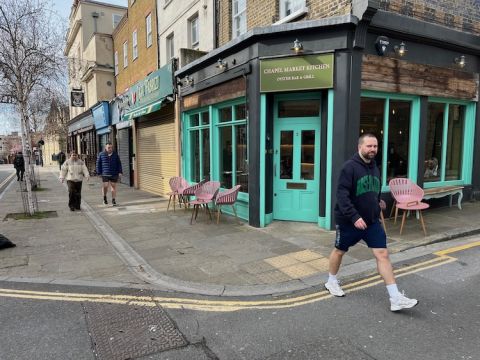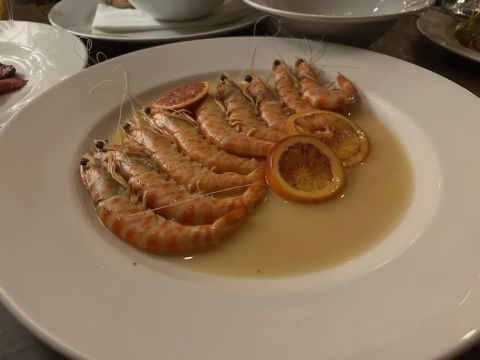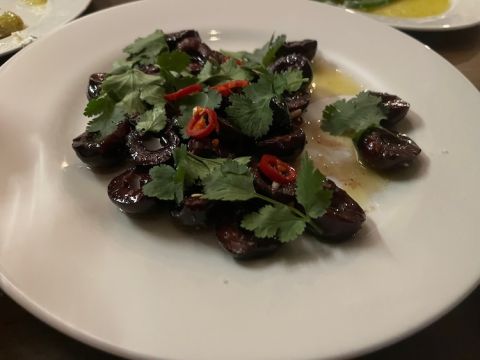A new addition to Chapel Market

Big, bearded Maoz Alonim has quit Israel for Islington, London.
I first met Maoz Alonim seven years ago and in a restaurant 3,500 km away from the one in which I met him recently for the second time.
The first was on a very warm evening in 2017 in Tel Aviv when we went with a couple of friends to eat at his restaurant, Basta in the Carmel Market. The food and the wines we drank were excellent and I described Alonim then as ‘an enthusiastic, bearded giant’.
Little has changed in him since then other than the odd grey hair, but his size, the beard, the enormity of his smile as he approached my table were just the same when I saw him again, this time behind the grill in the basement kitchen of his new restaurant, Chapel Market Kitchen, which he has just opened at the western end of the somewhat desolate Chapel Market in Islington, north London.
The connection is obvious. Alonim loves markets: their noise, their bustle, but above all their potential proximity to many of the suppliers to his kitchen. In Tel Aviv his fishmonger was no more than 50 m away from his restaurant, his butcher 200 m away, and down an alleyway was his Arab spice supplier, who still ground his spices by stone. Chapel Market may not have such charms – the abandoned pub next door to his new site and the run of closed shops opposite give it a post-nuclear feel – but it was enough to attract Alonim.
According to Alonim, ‘the site was the first one I saw when I started looking for venues for the restaurant. I was naturally drawn to the market environment; it is where I really feel at home. Aside from the market, I was also looking for a central location that is sufficiently removed from the more touristic areas of the city.’ I wondered why he decided to move to London. ‘I followed my heart’, he confessed. His partner teaches about the intersections between technology, democracy and law at Oxford University and so they now live in Notting Hill (which is handy for the bus to Oxford but quite a way from Islington).
On my first visit to Chapel Market Kitchen I was able to see and experience what had attracted Alonim. It occupies a corner site on a very quiet street with large windows through which the sunshine was pouring that day. And there was space outside for several tables and chairs – just as there are outside the much warmer Basta (which still operates and in which Alonim has a minority share).
As I walked in, it was impossible not to notice the young chef, Kristiyan Bodurov, hard at work opening oysters behind the counter as I took a seat directly opposite him. He looked up from his cutting board, wiped his hands, bade me welcome and passed over that day’s menu and wine list, on which every wine is available by the glass.
Behind Bodurov, and next to an ice-filled display cabinet full of bottles of white wine, is a vast display of oysters, also on ice, which reflects the restaurant’s style and also its personal nature. Alonim is a big oyster fan – he confessed that he could eat at Swan Oyster Depot in San Francisco every day.
I have to say that any menu and wine list which begins with a choice of seven sherries and finishes with crème caramel has my vote. And at this stage I didn’t know quite how good the dessert would be!
I began my first meal here, as so often a solitary lunch, with a glass of La Gitana Manzanilla, which put me in a great frame of mind, and then ordered a dish simply described as ‘anchovies/vanilla butter’. This was distinctive: the vanilla really added another layer of flavour to the butter and the whole dish. I followed this with a dish of green beans topped with labneh, the Middle Eastern cheese made from yogurt. By this time Alonim appeared bearing a small dish of cured kingfish with salsa di pane, a rather romantic-sounding bread sauce.
I finished my lunch with an excellent rendition of crème caramel served not in an individual dish, as has become the norm, but carved from a much larger portion behind the bar. Most importantly, it is topped with spoonfuls of extra sauce which ensured that my mouth reverberated with caramel when, having paid my bill of £34.31, I walked home.
The menu and the wine list were to prove even more enticing on my return in a party of four, with one exception. We began with glasses of sherry, three of El Maestro Sierra Fino and one Amontillado on this occasion, before moving on to a bottle of Niepoort’s surprisingly light red Drink Me 2021 from the Douro. We again enjoyed the kingfish, anchovies and the labneh with green beans and supplemented these with smoked sardines on toast and a dish of delicious soused mussels on toast which Alonim brought us.
We realised later we had rather over-ordered, having added four main courses. A dish of pink roast rump came straight off the grill, artfully arranged round a dollop of pale white horseradish. An elegant plate of 10 grilled Sanlúcar prawns had the sweetness of their flesh emphasised by a sauce finished with Manzanilla and topped by slices of blood orange. The generous portion of grilled octopus arrived last and we were able only to pick at it. With all these we ordered a dish described as ‘cavolo nero & payoyo’ which turned out to be a plate of crisp fronds of the vegetable topped with a grated cloud of this Spanish cheese made from the milk of ewes and Payoya goats, a Spanish breed. The acidity added freshness and bite but Alonim clearly has quite a heavy hand with the lemon juice.
The most unforgettable dish was something we had not ordered but Alonim delivered nonetheless. It was described on the menu as ‘Lali’s cherry salad’ comprising plump black Spanish cherries split and topped with coriander, slices of red chilli and generous amounts of salt, the key ingredient according to Alonim. This was as successful as it was surprising.
The only disappointment for me was the absence of that crème caramel. We passed on the only dessert of chocolate and cream and I paid the bill of £226.12 for four, including extremely personable service from Tal Mirone, whose energy, Alonim explained, has been ‘the driving force behind the opening’.
Chapel Street Market may be in an incongruous setting but this new restaurant appears to have settled in quietly and effectively – it was already full of apparently contented locals.
I asked Alonim to compare experiences in Tel Aviv and London. ‘I think the biggest difference is the ease with which one can get round complex supply chains in Israel. I really try to source my produce directly, and where possible locally. And somehow in London that doesn’t seem to be a straightforward endeavour. But it may well be that I just don’t know enough about London yet.
‘I think the biggest challenges actually lie in the little things – in getting to know how things are done locally and in bridging my knowledge and experiences to streamline the day-to-day operations of the restaurant. PR is of course difficult when you are new to any big city. It also goes without saying that finding available and passionate staff is always difficult, which is why I am so grateful for the people around me.’
Chapel Market Kitchen Oyster Bar & Grill, 2 Chapel Market, London N1 9EZ; tel: +44 (0)20 3621 2023. Closed Tuesday and Wednesday.
Every Saturday, Nick writes about restaurants. To stay abreast of his reviews, sign up for our weekly newsletter.
Become a member to view this article and thousands more!
- 15,404 featured articles
- 274,905 wine reviews
- Maps from The World Atlas of Wine, 8th edition (RRP £50)
- The Oxford Companion to Wine, 5th edition (RRP £50)
- Members’ forum
- 15,404 featured articles
- 274,905 wine reviews
- Maps from The World Atlas of Wine, 8th edition (RRP £50)
- The Oxford Companion to Wine, 5th edition (RRP £50)
- Members’ forum
- Commercial use of our Tasting Notes



